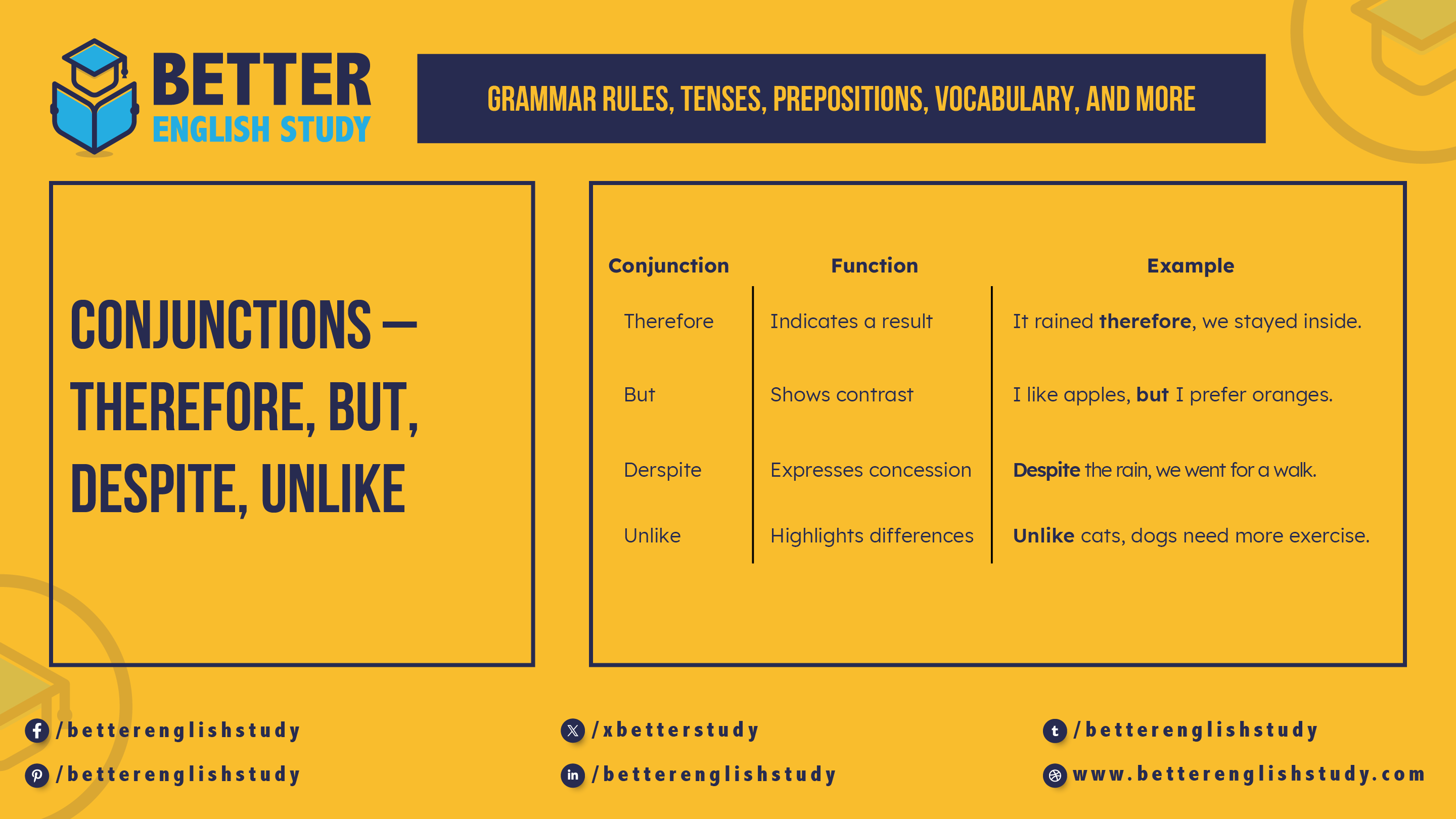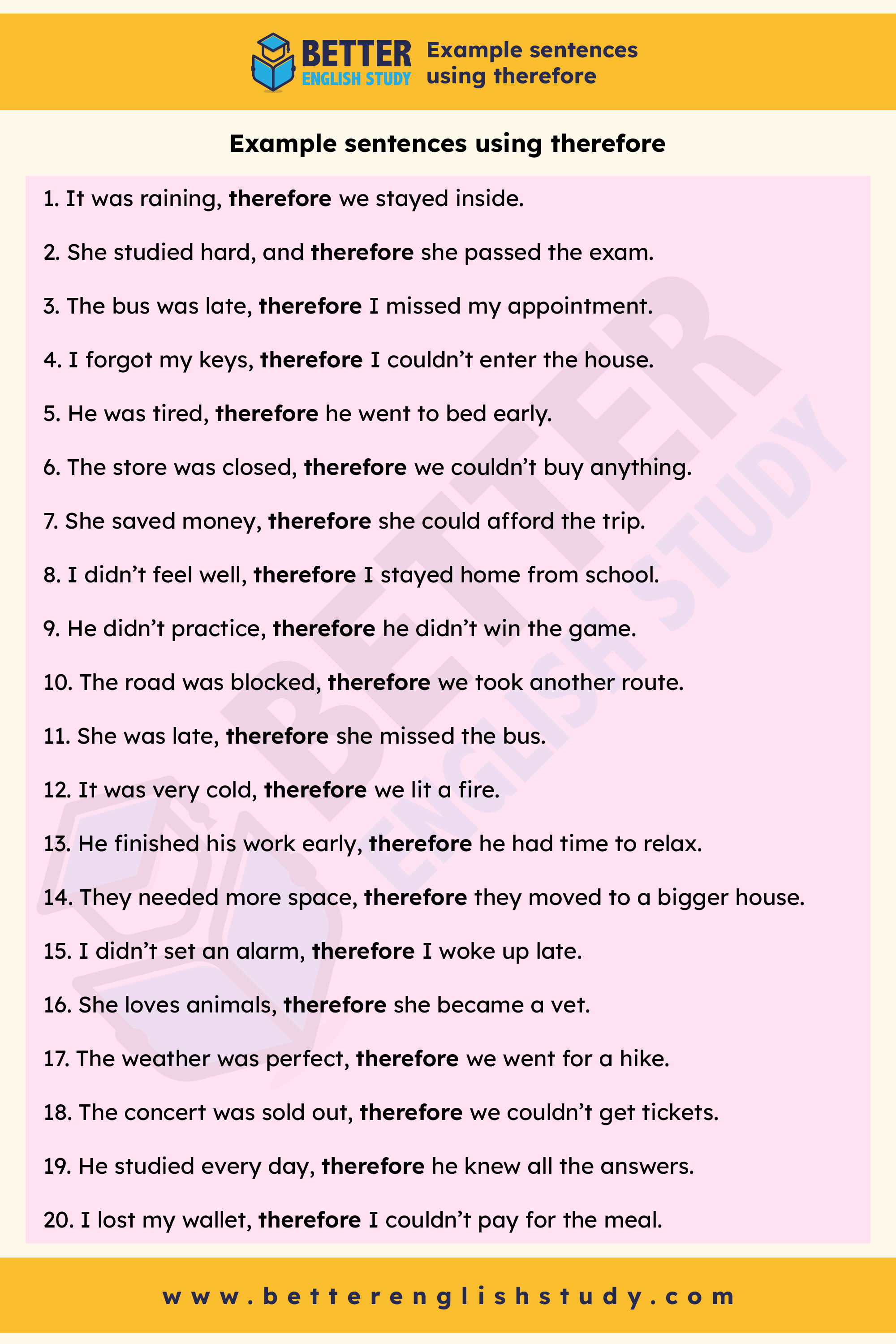
Conjunctions like “therefore,” “but,” “despite,” and “unlike” serve different purposes in connecting ideas. “Therefore” indicates a conclusion, “but” presents contrast, “despite” shows concession, and “unlike” highlights differences.
Using these conjunctions effectively can elevate your writing style. This guide will explore their meanings and provide examples for better comprehension. Mastering these conjunctions will improve your communication skills in both writing and speaking.
Introduction To Conjunctions
Conjunctions play a crucial role in sentence construction. They help connect words, phrases, or clauses smoothly. This connection makes sentences clearer and easier to understand. Common conjunctions include “therefore,” “but,” “despite,” and “unlike.”
Each conjunction has a unique function:
| Conjunction | Function | Example |
|---|---|---|
| Therefore | Indicates a result | It rained; therefore, we stayed inside. |
| But | Shows contrast | I like apples, but I prefer oranges. |
| Despite | Expresses concession | Despite the rain, we went for a walk. |
| Unlike | Highlights differences | Unlike cats, dogs need more exercise. |
Diving Into ‘therefore’
The word therefore shows a result or consequence. It connects ideas clearly.
Use therefore when you explain what happens because of something else. It helps readers understand the flow of thought.
Here are some examples:
- It was raining. Therefore, we stayed indoors.
- She studied hard. Therefore, she passed the exam.
- He forgot his lunch. Therefore, he was hungry.
20 example sentences using therefore
- It was raining, therefore we stayed inside.
- She studied hard, and therefore she passed the exam.
- The bus was late, therefore I missed my appointment.
- I forgot my keys, therefore I couldn’t enter the house.
- He was tired, therefore he went to bed early.
- The store was closed, therefore we couldn’t buy anything.
- She saved money, therefore she could afford the trip.
- I didn’t feel well, therefore I stayed home from school.
- He didn’t practice, therefore he didn’t win the game.
- The road was blocked, therefore we took another route.
- She was late, therefore she missed the bus.
- It was very cold, therefore we lit a fire.
- He finished his work early, therefore he had time to relax.
- They needed more space, therefore they moved to a bigger house.
- I didn’t set an alarm, therefore I woke up late.
- She loves animals, therefore she became a vet.
- The weather was perfect, therefore we went for a hike.
- The concert was sold out, therefore we couldn’t get tickets.
- He studied every day, therefore he knew all the answers.
- I lost my wallet, therefore I couldn’t pay for the meal.

Exploring ‘but’
But is a common conjunction used to show contrast. It connects two ideas that are different or opposing.
For example, “I want to go to the park, but it is raining.” This means the rain stops you from going.
Another example is, “She loves ice cream, but she is lactose intolerant.” Here, it shows a conflict between love and health.
Using but helps clarify thoughts. It makes writing and speaking more effective. It allows for a smoother flow between contrasting ideas. Always remember to place but between two complete thoughts.
20 example sentences using But
- I wanted to go to the party, but I was too tired.
- She likes pizza, but she doesn’t like cheese.
- He studied hard, but he didn’t pass the test.
- I called you, but you didn’t answer.
- It’s sunny, but it’s still cold outside.
- She is smart, but sometimes she forgets things.
- He tried to fix the car, but it wouldn’t start.
- I love coffee, but I can’t drink it at night.
- They invited me, but I couldn’t go.
- I want to go for a walk, but it’s raining.
- He’s fast, but she’s faster.
- I like the color, but not the style of the shirt.
- We were ready to leave, but the bus was late.
- She’s friendly, but a little shy at first.
- I was hungry, but there was no food left.
- He wants to play soccer, but he has a lot of homework.
- I have a bike, but I rarely ride it.
- She sings well, but she doesn’t like performing.
- I was excited, but also nervous about the trip.
- He bought a new phone, but he doesn’t know how to use it.
Understanding ‘despite’
Despite is used to show contrast. It helps connect ideas that seem opposite.
For example, you might say, “He went for a walk despite the rain.” This means he walked even though it was raining.
Another example is, “She smiled despite feeling sad.” This shows she was happy on the outside, even if she was sad inside.
Using despite makes sentences clearer. It highlights the differences between two ideas. It’s great for storytelling and writing.
20 example sentences using Despite
- Despite the rain, we went for a walk.
- She passed the exam despite not studying much.
- Despite feeling tired, he finished the race.
- Despite the cold weather, they went to the beach.
- He was happy despite losing the game.
- Despite her injury, she continued to play.
- They arrived on time despite the heavy traffic.
- Despite being scared, she spoke in front of the class.
- We had a good time despite the bad weather.
- He kept smiling despite the bad news.
- Despite his hard work, he didn’t get the promotion.
- Despite being hungry, I waited for dinner.
- She stayed calm despite the chaos around her.
- Despite the noise, the baby slept peacefully.
- Despite the high prices, they bought the tickets.
- He finished the project despite starting late.
- Despite their argument, they remained friends.
- Despite the long hours, she loves her job.
- Despite the difficulty, he solved the puzzle.
- Despite not knowing anyone, she enjoyed the party.
Unpacking ‘unlike’
The word unlike shows differences between two things. It helps compare things that are not the same.
For example, “Dogs are friendly, unlike cats.” Here, it shows that dogs and cats behave differently.
Another example is, “She loves summer, unlike her brother.” This means her brother does not enjoy summer.
Using unlike makes sentences clear and easy to understand. It helps readers see how things differ.
20 example sentences using Unlike
- Unlike his brother, he enjoys reading.
- Unlike cats, dogs need more attention.
- She likes spicy food, unlike me.
- Unlike the summer, winters here are very cold.
- Unlike his friends, he prefers to stay home.
- Unlike my old phone, this one has a great camera.
- Unlike most people, I enjoy waking up early.
- Unlike her sister, she is very shy.
- This hotel is quiet, unlike the busy one downtown.
- Unlike the other students, he finished the exam early.
- Unlike me, she is good at math.
- Unlike last year, the weather is much better now.
- Unlike traditional books, e-books don’t take up space.
- He is tall and athletic, unlike his younger brother.
- Unlike the previous version, this software is easier to use.
- Unlike her classmates, she loves studying science.
- Unlike the others, this cake has no sugar.
- Unlike many people, he enjoys working late.
- Unlike other animals, birds can fly.
- Unlike most children, he doesn’t like candy.
Common Mistakes To Avoid
Many people misuse ‘Therefore’. This word shows a reason or result. Using it incorrectly can confuse the meaning.
Misusing ‘But’ is also common. This word contrasts two ideas. It should only connect opposing thoughts.
Some overlook ‘Despite’. This word shows a surprising result. Ignoring it can lead to unclear sentences.
Confusion with ‘Unlike’ happens often. This word compares two different things. Using it wrongly changes the message.
Frequently Asked Questions
What Are Conjunctions Like “therefore” And “but”?
Conjunctions are words that connect clauses or sentences. “Therefore” indicates a conclusion, while “but” contrasts ideas. These conjunctions enhance clarity in writing. Understanding their usage helps improve your communication skills. Use them to link thoughts effectively in your writing.
How Do I Use “despite” In A Sentence?
“Despite” introduces a contrast or exception. For example, “Despite the rain, we went for a walk. ” It emphasizes overcoming obstacles. Using “despite” adds depth to your writing. It highlights resilience and determination in the face of challenges. Practice with various examples to master its usage.
What Is The Role Of “Unlike” In Writing?
“Unlike” serves to highlight the differences between two subjects. For instance, “Unlike cats, dogs are social animals. ” It helps create a clear distinction. This conjunction improves your writing by fostering clarity. Use “unlike” to emphasize contrasts effectively and engage your readers.
Can Conjunctions Improve My Writing Style?
Yes, using conjunctions can greatly enhance your writing style. They create smoother transitions between ideas. This makes your writing more cohesive and engaging. Using words like “therefore” and “but” can clarify your arguments. Overall, conjunctions are essential for effective communication.
Conclusion
Understanding conjunctions like “therefore,” “but,” “despite,” and “unlike” enhances your writing clarity. These words connect ideas effectively and improve sentence flow. By incorporating them into your writing, you can express complex thoughts with ease. Embrace these conjunctions to elevate your communication skills and make your writing more engaging.
